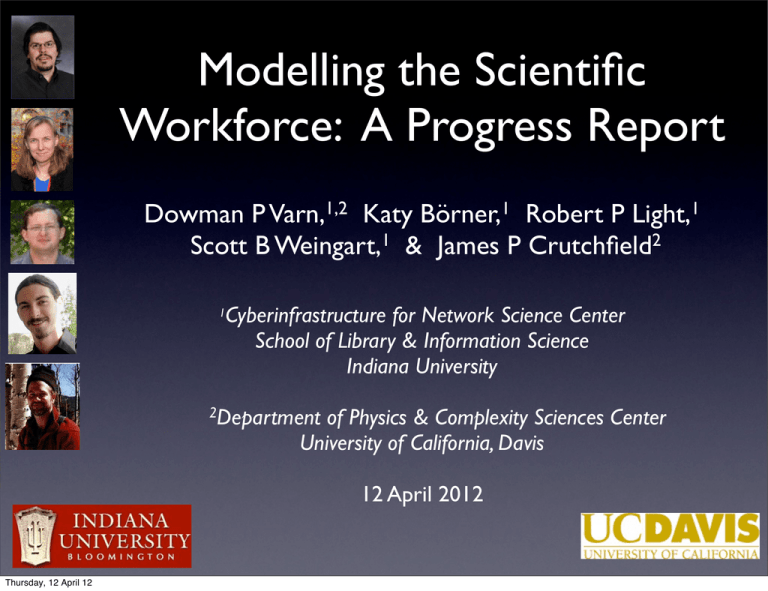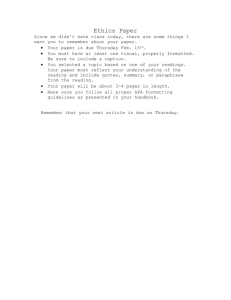Modelling the Scientific Workforce: A Progress Report Dowman P Varn, Katy Börner,
advertisement

Modelling the Scientific Workforce: A Progress Report Dowman P Varn,1,2 Katy Börner,1 Robert P Light,1 Scott B Weingart,1 & James P Crutchfield2 Cyberinfrastructure for Network Science Center School of Library & Information Science Indiana University 2Department of Physics & Complexity Sciences Center University of California, Davis 1 12 April 2012 Thursday, 12 April 12 Questions ... • • • • • • Thursday, 12 April 12 What roles do gender and ethnicity play in the evolution of a successful career? What is the effect of geolocation on a successful career? What are the effects of collaboration and competition on career success? What are the most successful scholarly areas and career trajectories across the career landscape? How do US scholars react to exogenous shocks? Are some institutions sinks or sources for scholars? Research Efforts 1. First Principles Definitions of: (a) Scholars; (b) Careers; & (c) Events. 2. Data Acquisition & Analysis: (a) NSF-SDR; & (b) Web of Science. 3. Modelling the Scholarly Workforce: (a) Multi-Agent Dynamical Systems. Thursday, 12 April 12 (I.a) Scholars Colloquially, a scholar, θ, is someone who engages in the publication of scholarly research, or has a scholarly education. • • • • • Thursday, 12 April 12 Autonomous Agents; Perform Certain Actions -- e.g. publish papers, work at institutions; Have Attributes -- e.g., gender, ethnicity, geolocation; Can Store and Process Information -- remember other researchers and past actions; & Can Pursue Goals -- seek recognition from peers. (1.b) Events Let an event, ω, be some thing that happens to an agent or its environment, or that the agent does to itself or environment. • • • • Thursday, 12 April 12 Can Βe Active or Passive; Must Have a Particular Start Date; Can Βe of Indefinite Duration; & Can Βe Endogenous or Exogenous. (1.c) Career Let us define a career, Ψ, as the time ordered sequence of events that spans the active life of the scholar. This is just a record of what each scholar did, much like one would find on an academic curriculum vitae. We can express this as a series of events, ω1, ω2, ..., ω L. How much can we infer from data? Thursday, 12 April 12 (2) Data Aquisition & Analysis We are considering two data sets: (a) The National Science Foundation Survey of Doctoral Recipients (NSF-SDR); & (b) Web of Science (WoS) Thursday, 12 April 12 (3) Modelling the Scholarly Activity (a) Multi-Agent Dynamical Systems (MADS) Thursday, 12 April 12 Multi-Agent Dynamical Systems • Agent-Based Modelling • Game Theory • Reinforcement Learning • Nonlinear Dynamics Thursday, 12 April 12 Agent-Based Modelling • Thursday, 12 April 12 Agents (Scholars) have attributes and can perform actions Game Theory • The reward that an agent receives for an action depends not only on his choice of actions, but also on that of the other agents. Agent B C Agent A Thursday, 12 April 12 D C (3,3) (0,5) D (5,0) (1,1) C: Cooperate D: Defect Reinforcement Learning • Adjusts choice of actions depending on results of previous actions. • Competition between “exploitation” and “exploration” • Two parameter (α and β) model Thursday, 12 April 12 Nonlinear Dynamics • Put all this together into a set of coupled, nonlinear, first-order differential equations. • Have the entire theory of nonlinear dynamics at our disposal. Thursday, 12 April 12
